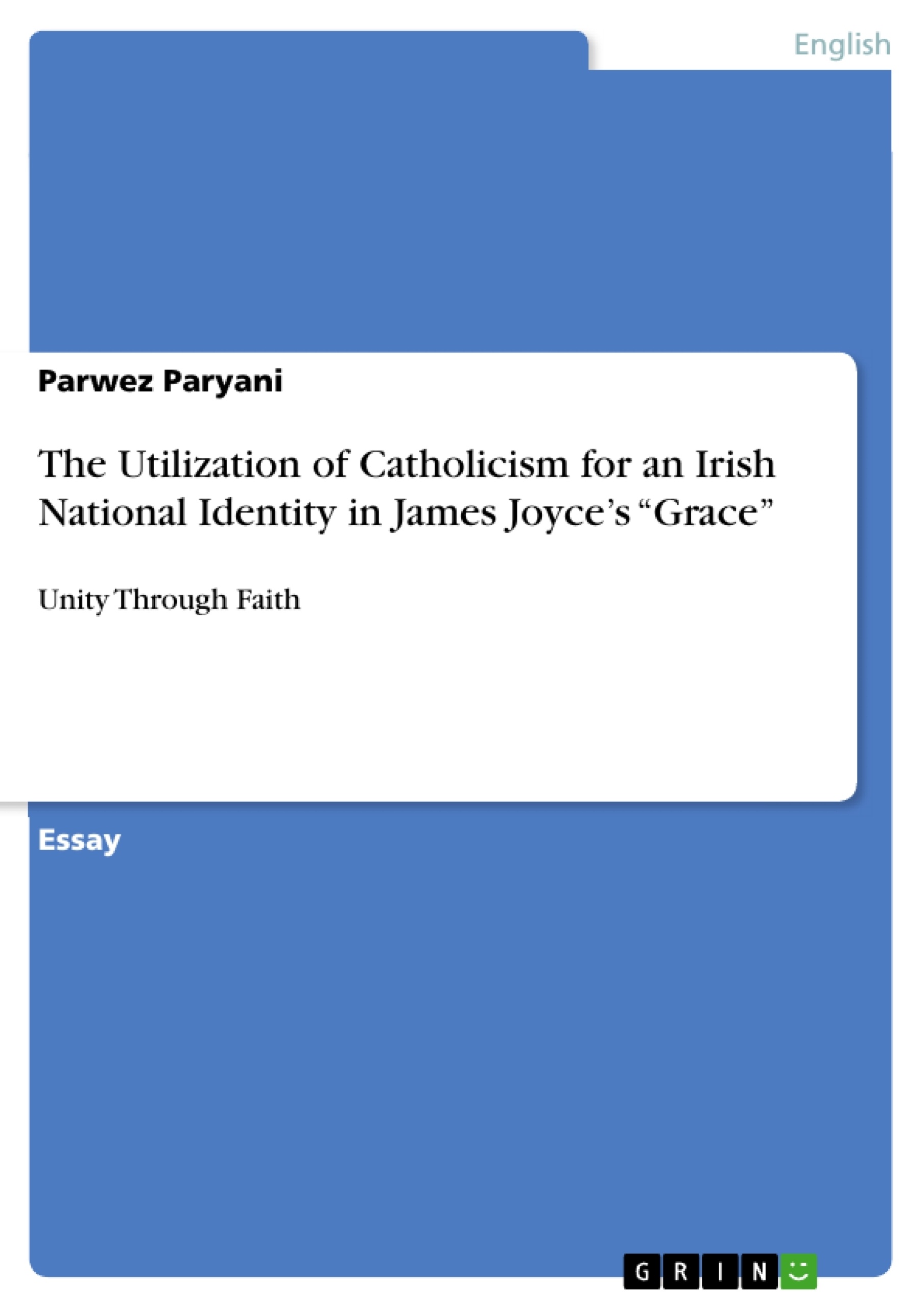James Joyce’s short story “Grace”, published amongst a collection of various other socio-critical stories about the life in Dublin, offers a subliminal insight into the influential role of the Catholic Church in Irish communities of the late 19th and early 20th century. At first glance, “Grace” could simply be labelled as a mocking satire of disingenuous Irish believers using Catholicism merely for the purpose of social integrity.
A further look although unfolds a deeper lying, much more sophisticated layer of criticism addressing the impact of the Church as a surrogate authority justifying nationalist movements in the Irish society. The Irish, in strong need of a common identity that was clearly distinguishable from alien forces, left a vacuum for clergymen to fill and thus exchanged Irish Gaelic traditions with Catholic faith and its dogmas. Nationalists utilized this new established bond to unify the Irish for political purposes, hence drew a psychological demarcation line between Ireland and the British invaders. Interpreting certain parts of “Grace”, it is arguable that Joyce could have held the Church’s worldly ambitions responsible for the political stasis of the Irish. The aim of this paper is to find out whether this theory can be validated or not. Whilst referring to historical evidence , two passages of “Grace” will be examined to investigate how and why Joyce displayed features of Catholicism in the daily routine of the Irish.
Inhaltsverzeichnis (Table of Contents)
- Introduction
- Influence of Catholicism in Irish Social Life
- The Partition of Ireland
- Catholic Schools
- Nationalist Movements
- Analysis - Papal Infallibility
Zielsetzung und Themenschwerpunkte (Objectives and Key Themes)
This paper examines James Joyce's short story "Grace" to explore the influence of Catholicism on Irish society during the late 19th and early 20th centuries. The story offers a nuanced critique of the Church's role as a surrogate authority, its impact on Irish identity, and its influence on political and social life.
- The impact of the Catholic Church as a surrogate authority in Irish society.
- The role of Catholicism in shaping Irish identity and its relationship with nationalist movements.
- The influence of the Church on Irish education and social norms.
- The interplay between Catholicism and Irish political aspirations.
- Joyce's critical perspective on the Church's influence on Irish society.
Zusammenfassung der Kapitel (Chapter Summaries)
- Introduction: This section introduces the context of James Joyce's short story "Grace" and its focus on the influence of Catholicism in Irish society. It highlights the story's satirical portrayal of Irish believers and explores the deeper layer of criticism regarding the Church's role in shaping Irish identity and nationalism.
- Influence of Catholicism in Irish Social Life: This section delves into the impact of Catholicism on various aspects of Irish social life. It examines the Church's influence on rural areas, its control over schools, and its role in shaping Irish identity and political aspirations. The section highlights the Church's successful indoctrination of its followers and its influence on political decisions.
- Analysis - Papal Infallibility: This section analyzes a key passage in "Grace" concerning the infallibility of Popes. It explores the significance of John McHale's resistance to the doctrine and its connection to Irish identity and nationalism. The section examines how the Church's authority and the Irish people's obedience to it may have stifled political progress.
Schlüsselwörter (Keywords)
The main keywords and focus topics of this paper include: James Joyce, "Grace," Irish Catholicism, Irish nationalism, surrogate authority, Irish identity, political influence, education, social norms, papal infallibility, John McHale, and the Catholic Church.
Frequently Asked Questions
What is the central theme of James Joyce's story 'Grace'?
The story critiques the influential role of the Catholic Church in Irish society and its use as a surrogate authority for national identity.
How did Catholicism influence Irish Nationalism?
Nationalists used the Catholic faith to unify the Irish against British invaders, replacing Gaelic traditions with religious dogmas to create a psychological demarcation line.
What does Joyce satirize in 'Grace'?
Joyce satirizes disingenuous believers who use religious rituals merely for social integrity and status within their communities.
What role did Catholic schools play in Indoctrination?
The Church held significant control over education, ensuring that Catholic values and obedience to clergymen were deeply ingrained from a young age.
Why is 'Papal Infallibility' mentioned in the analysis?
The doctrine serves as a symbol of absolute authority, reflecting how the Church's worldly ambitions may have contributed to Ireland's political stasis.
- Citation du texte
- Parwez Paryani (Auteur), 2013, The Utilization of Catholicism for an Irish National Identity in James Joyce’s “Grace”, Munich, GRIN Verlag, https://www.grin.com/document/338050



